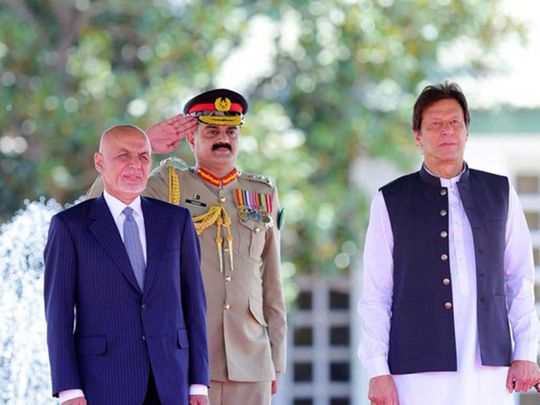
Islamabad: Pakistan Prime Minister Imran Khan is set to visit Afghanistan on November 19 on the invitation of President Ashraf Ghani. This will be the Pakistani premier’s first visit to the neighbouring country since assuming office in 2018.
Bilateral ties, peace process and connectivity
Foreign Minister Shah Mahmood Qureshi, Adviser for Commerce and Investment, and other senior officials will also accompany the prime minister, according to an official statement. The visit aims to further “deepen the fraternal bilateral relations between Pakistan and Afghanistan”, discuss the Afghan peace process, and regional economic development and connectivity.
The premier’s visit is part of regular high-level exchanges between the two countries following the recent visit of Afghan parliamentarians and Chairman High Council for National Reconciliation (HCNR) Dr Abdullah Abdullah. President Ashraf Ghani had last visited Pakistan in June 2019.
Expansion of trade ties
The prime minister’s visit comes after Pakistan’s Adviser for Commerce and Investment Razak Dawood wrapped up his two-day visit to Kabul endeavouring to resume formal trade talks after a gap of four years. He expressed hope that Pakistan Transit Trade Agreement (APTTA) and Preferential Trade Agreement (PTA) will be finalised by the end of January 2021. Dawood said that his visit marked the “beginning of a new era of trade and investment cooperation” that would also enhance “Pakistan’s exports to Afghanistan and beyond, to the Central Asian countries.”
Pakistan recently hosted “Pakistan-Afghanistan Trade and Investment 2020″ conference to explore trade cooperation. Pakistan has also facilitated visa services for Afghan nationals, and opened new border crossing-points to accelerate transit trade, bilateral trade and two-way travel.
Overcome mistrust and expand bilateral ties
Pakistan’s role has been significant in facilitating the Afghan peace process that culminated US-Taliban 2020 agreement and laid the groundwork for resuming intra-Afghan talks and beginning of an end to the decades-long Afghan crisis. Despite recent successes, mistrust and border tensions continue to plague Islamabad-Kabul ties. Analysts believe PM Imran Khan’s crucial visit will offer the two neighbours an opportunity to overcome misunderstanding.
What will be on PM Khan’s agenda to improve Pak-Afghan ties?
There are a number of issues expected to be discussed during PM Khan’s visit but experts believe that the focus will be on counter-terrorism efforts, border management and trade.
Politico-diplomatic ties
“The top agenda should be to maintain the positive momentum between Pakistan and Afghanistan that the leaders of the two countries have developed during the last few years” through different working groups “to fight terrorism, to promote economic interests and regional connectivity”, Dr Khurram Iqbal, head of International Relations department at National Defence University (NDU), Islamabad, told Gulf News. The politico-diplomatic, military-to-military and intelligence cooperation task force formed under the Afghanistan Pakistan Action Plan for Peace and Solidarity (APAPPS) can help accelerate progress.
Terrorism and border management
The second important issue is the “presence of anti-Pakistan terrorist organizations and leaders on Afghan soil” who take advantage of the porous Pak-Afghan border to “attack Pakistan’s armed forces, law enforcement agencies, and people” frequently. “There is a need to enhance border management and Pakistani leadership must take Afghanistan into confidence” in this regard.
Syed Ali Zia Jaffery, a research associate at Centre for Security, Strategy and Policy Research, also believes that counterterrorism should be high on the agenda. “Anti-Pakistan groups like Tehreek-e-Taliban Pakistan (TTP) and its subsidiaries found safe havens inside Afghanistan, after these groups were flushed out by Pakistan” which makes it essential that “Pakistani authorities vociferously take up the issue of [terror] sanctuaries in Afghanistan”, Ali stressed.
Education and people-to-people ties
At the same time, Kabul and Islamabad must work towards “bolstering bilateral relations in areas such as economy, culture and people-to-people contact” says Dr Khurram. Pakistan offered 800 scholarships to Afghan students this year – an initiative lauded by Afghan officials and students. Pakistan should “Expand the scope of scholarships, by inducting student and scholar exchange programs to create a better understanding between the two academic communities” Ali Zia suggested.
Afghan peace process
Another key discussion would be on the roadmap for Afghan peace process especially after administration change in the United States. “The stakes are high for the success of intra-Afghan dialogue but there is uncertainty as we are still not clear on US President-elect Joe Biden’s direction [on Afghan peace process]”, commented Dr Khurram. Pakistan is extremely cautious at the moment as “any effort to scuttle the ongoing peace process would have direct ramifications for Pakistan which it cannot afford”.
Refugee repatriation
Dignified and steady return of Afghan nationals to their homeland is also expected to come under discussion. Pakistan which has hosted over two million Afghan refugees for the last 40 years has called for “time-bound, dignified, gradual, and complete return of Afghan refugees” to their homeland, following the peace and reconciliation process in Kabul.








